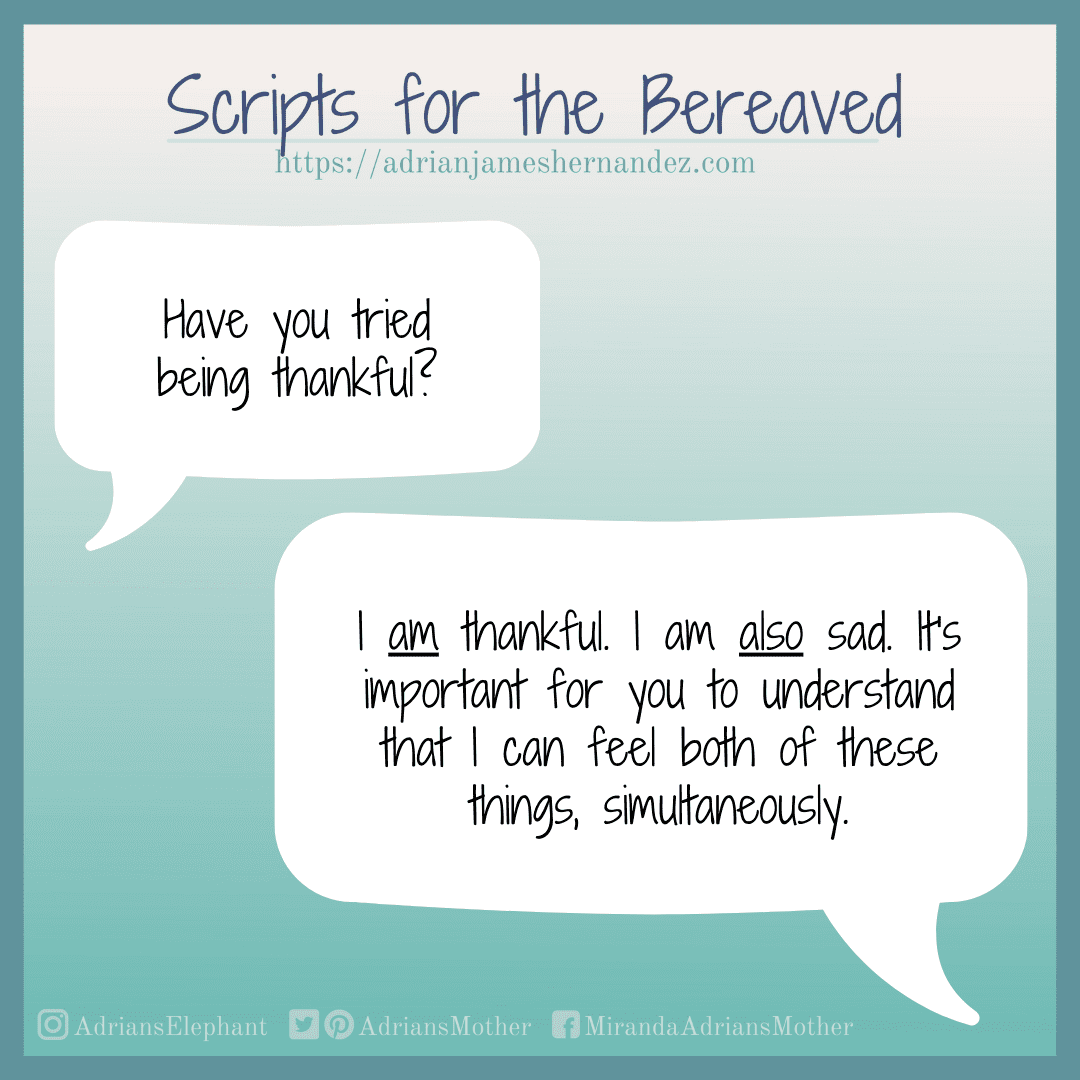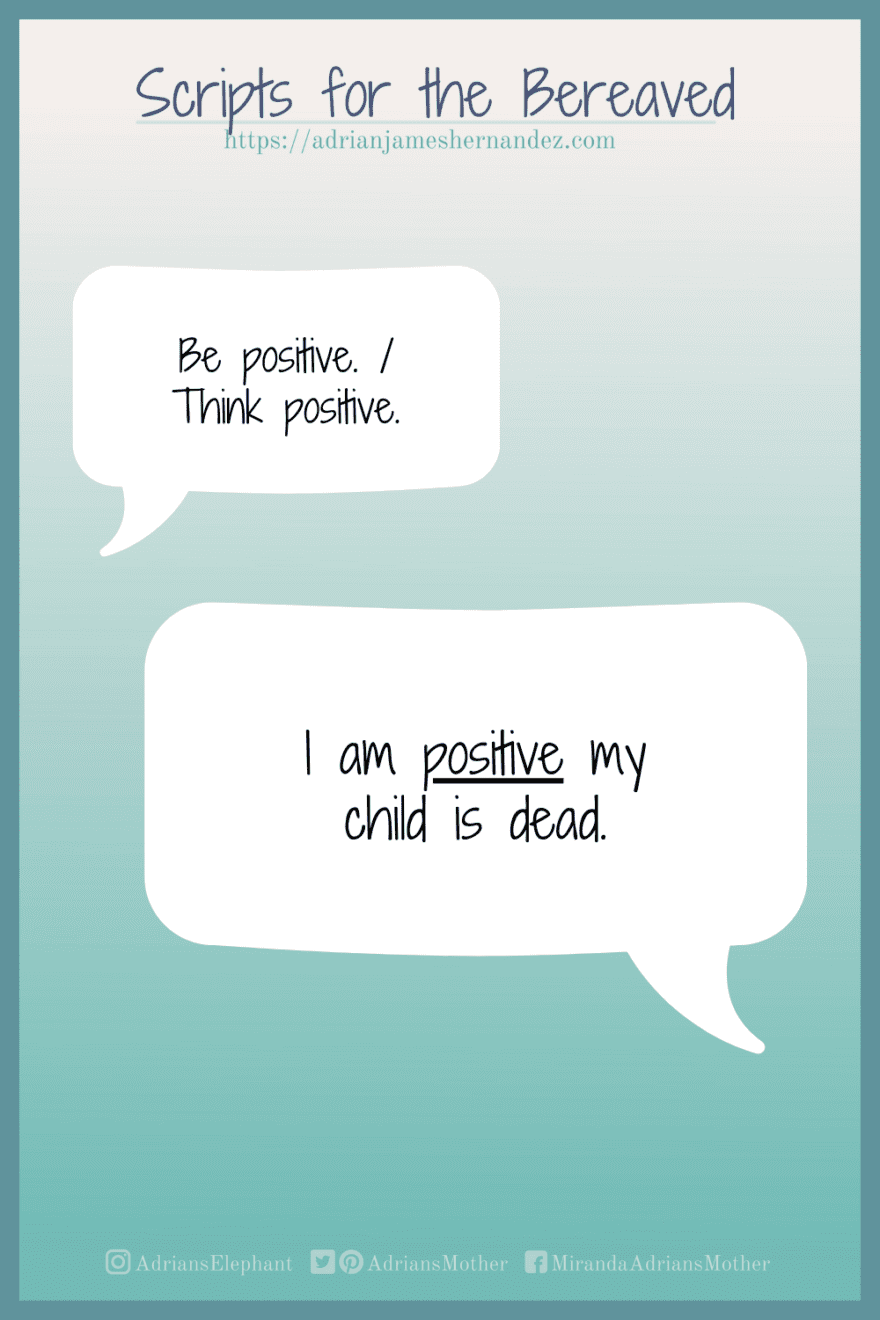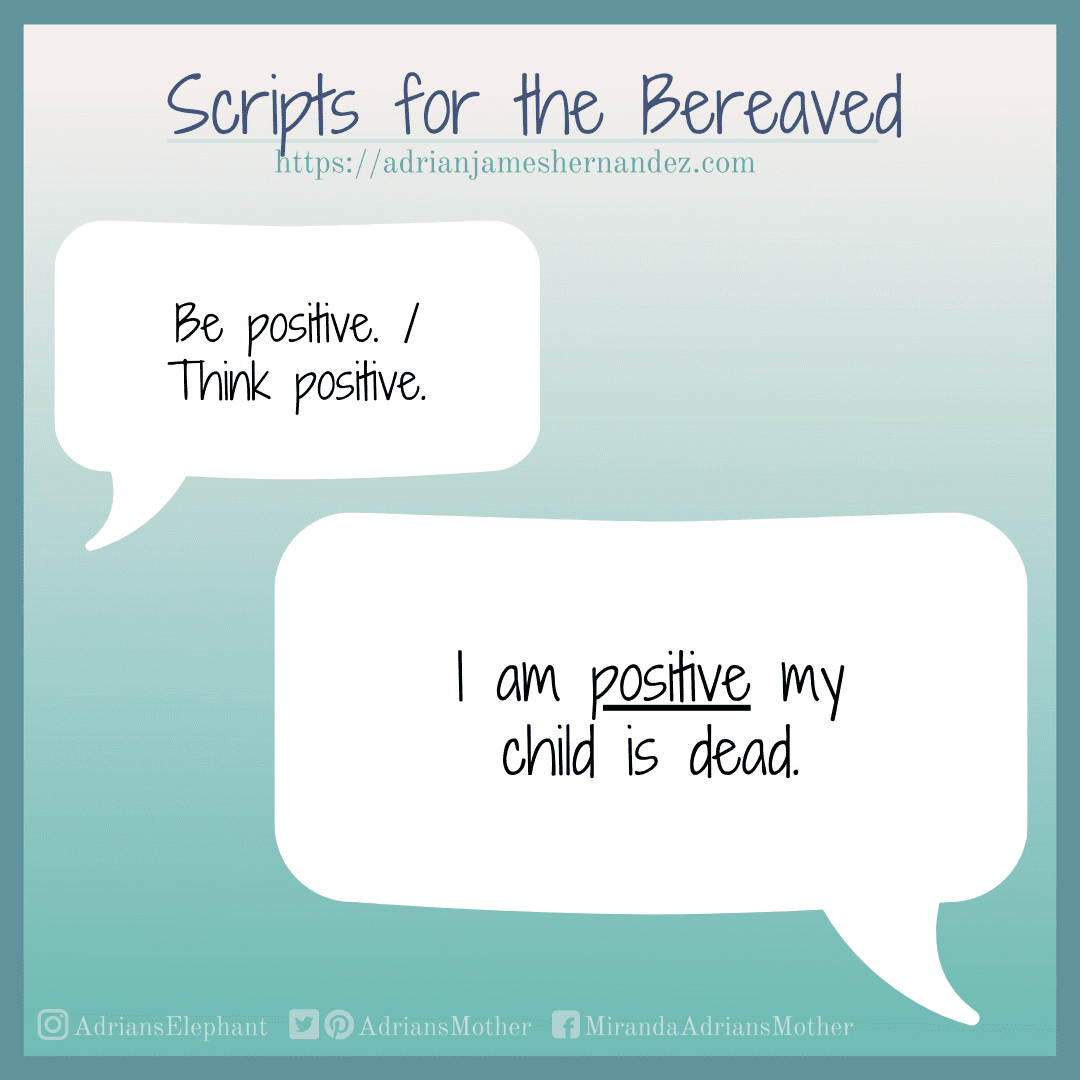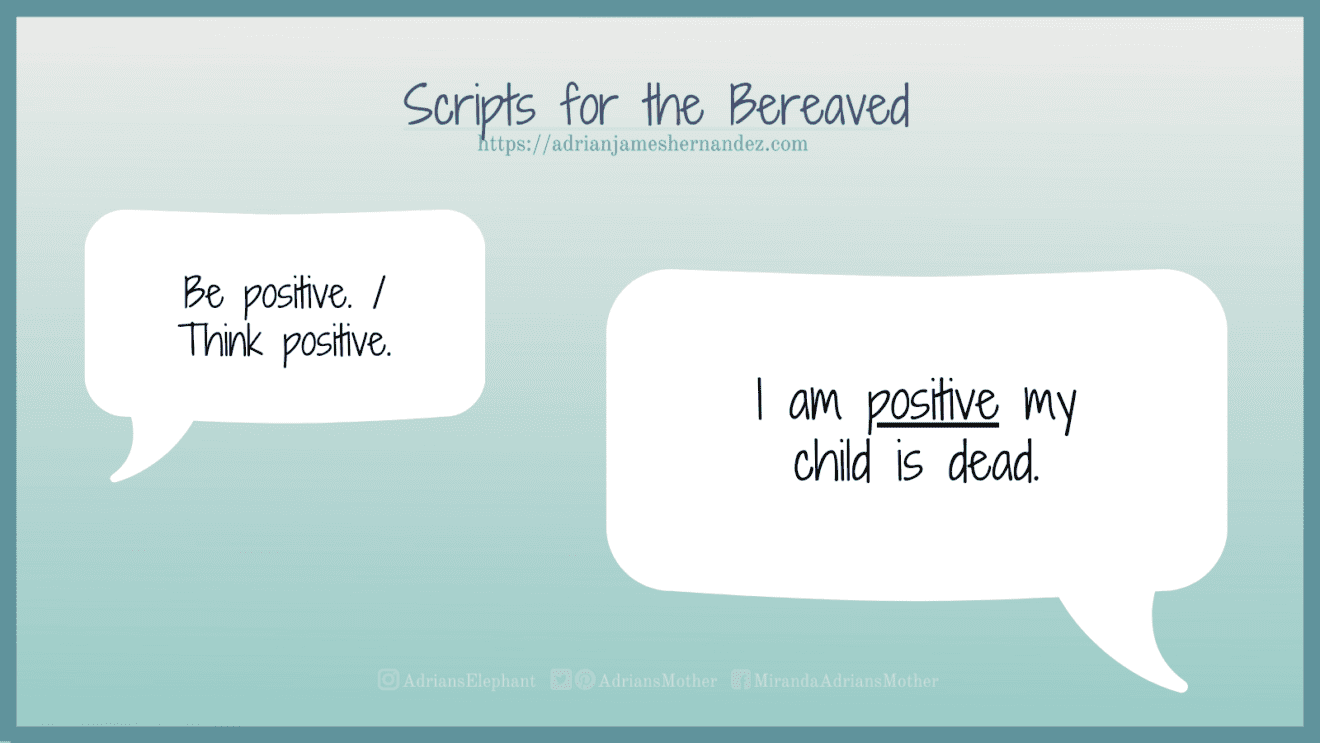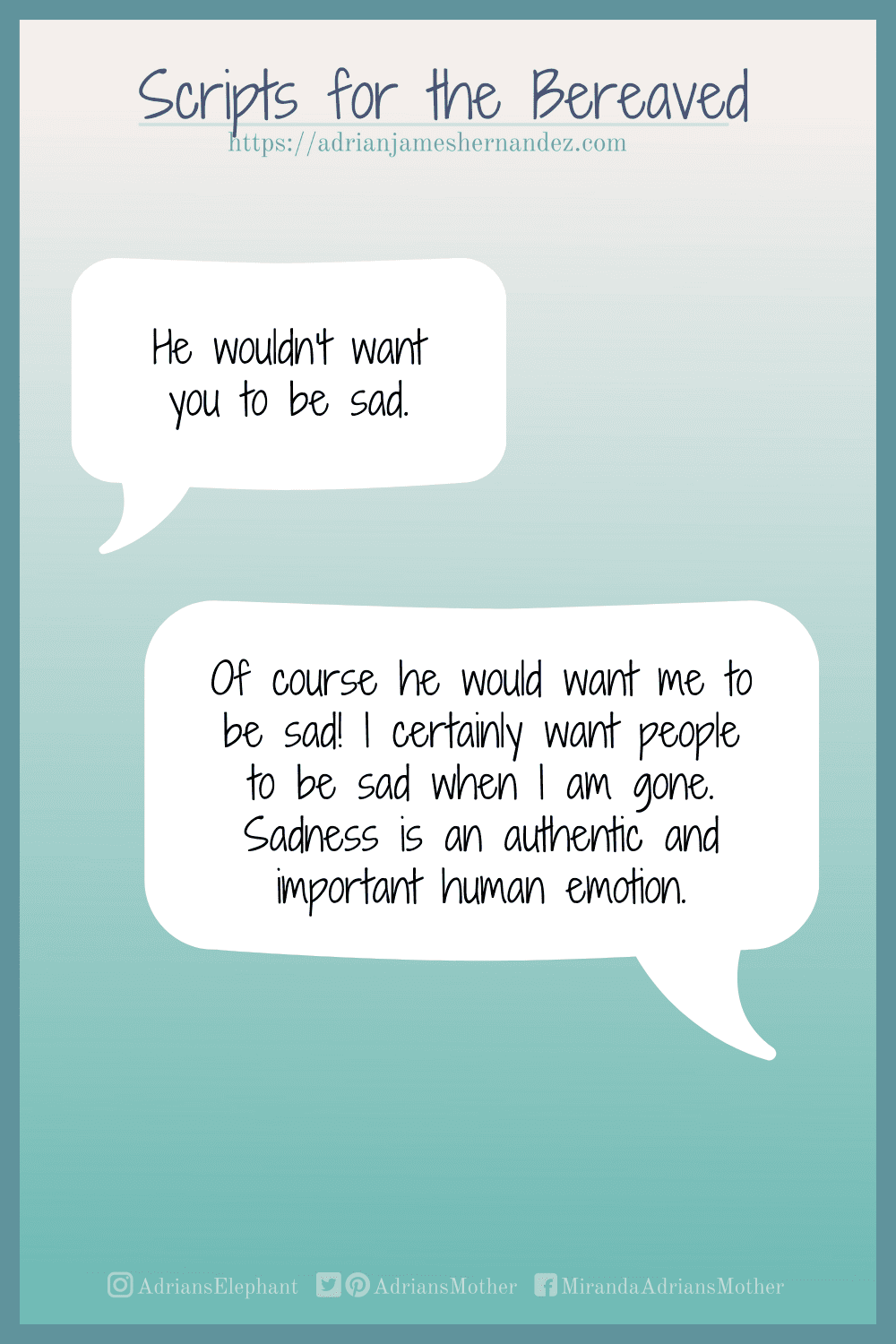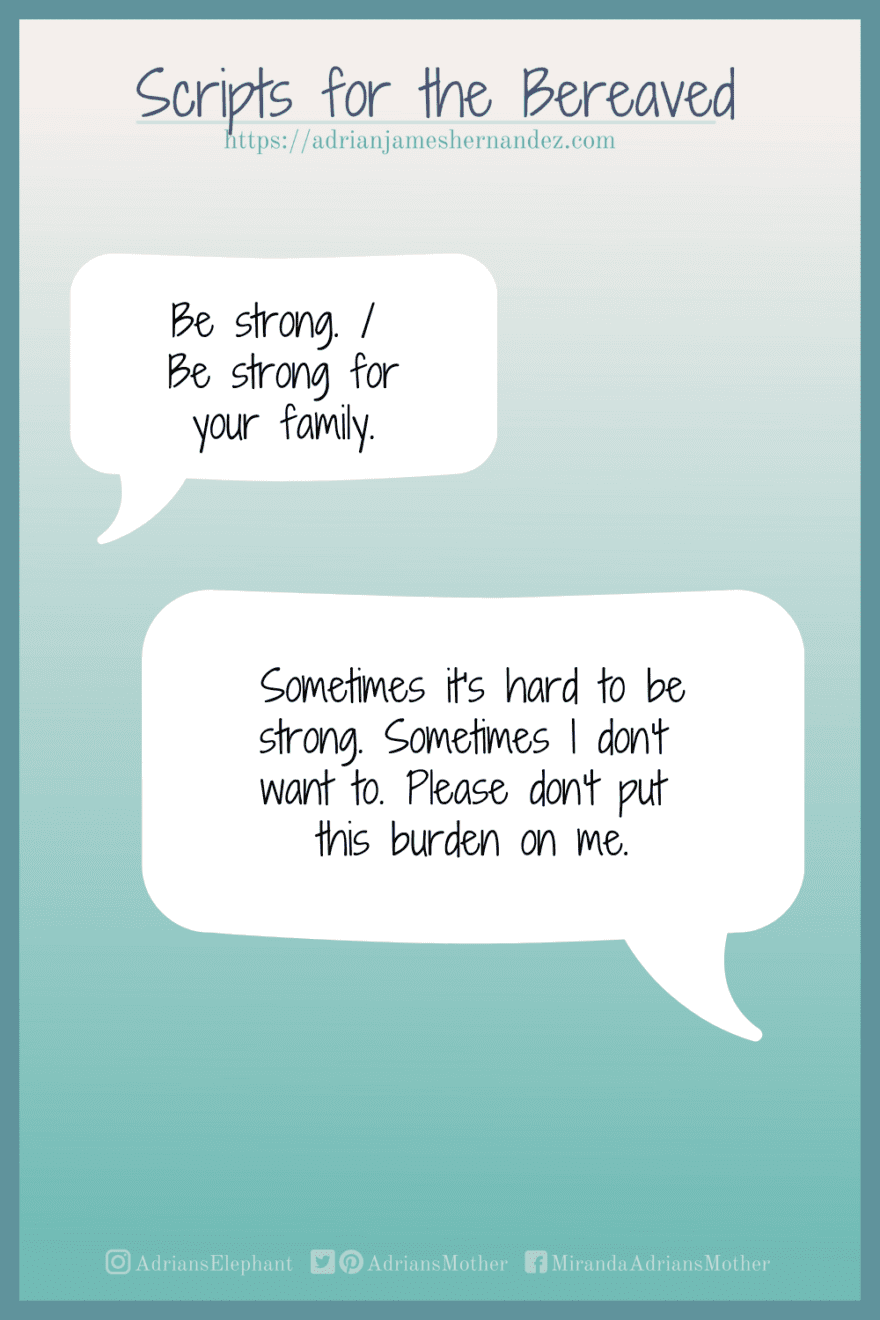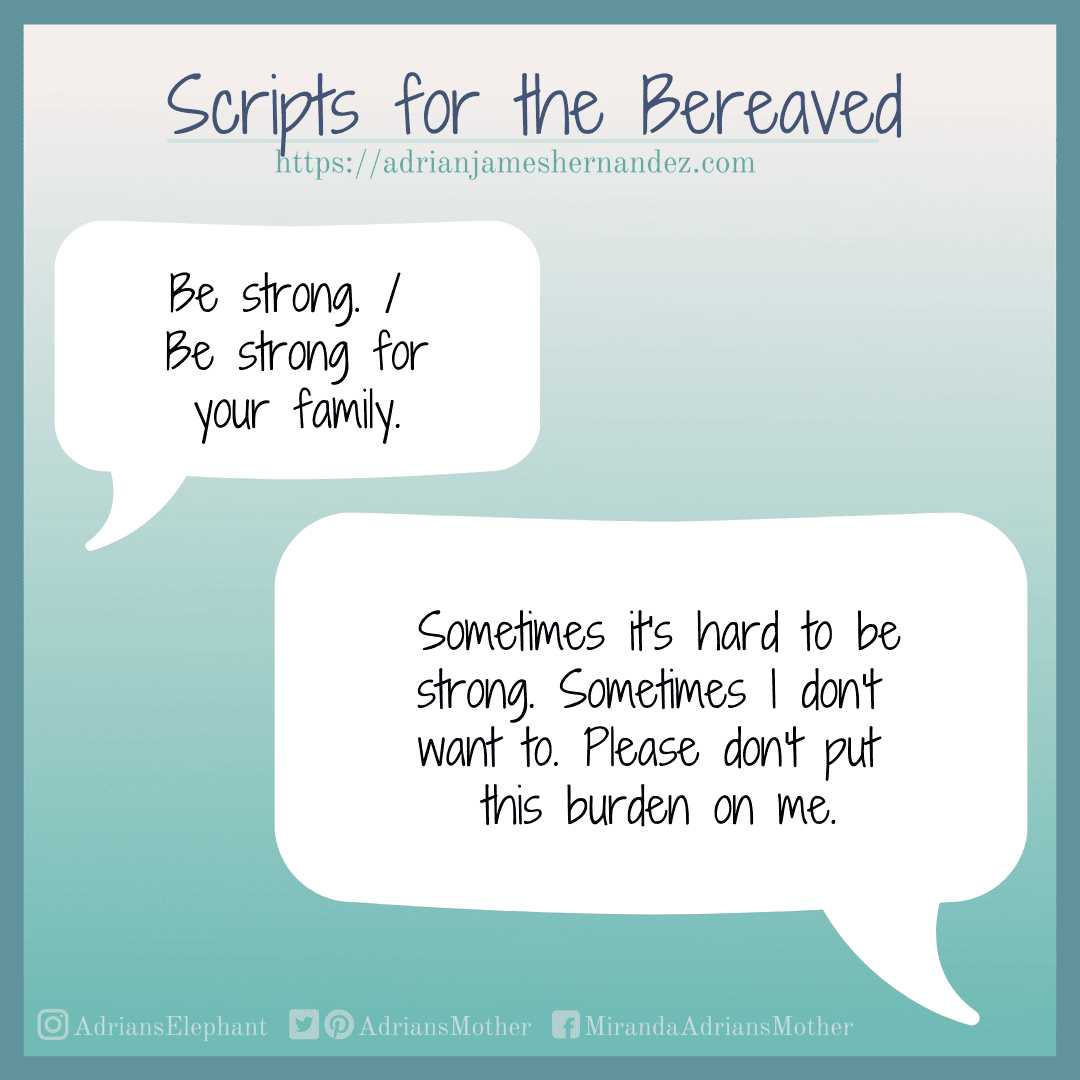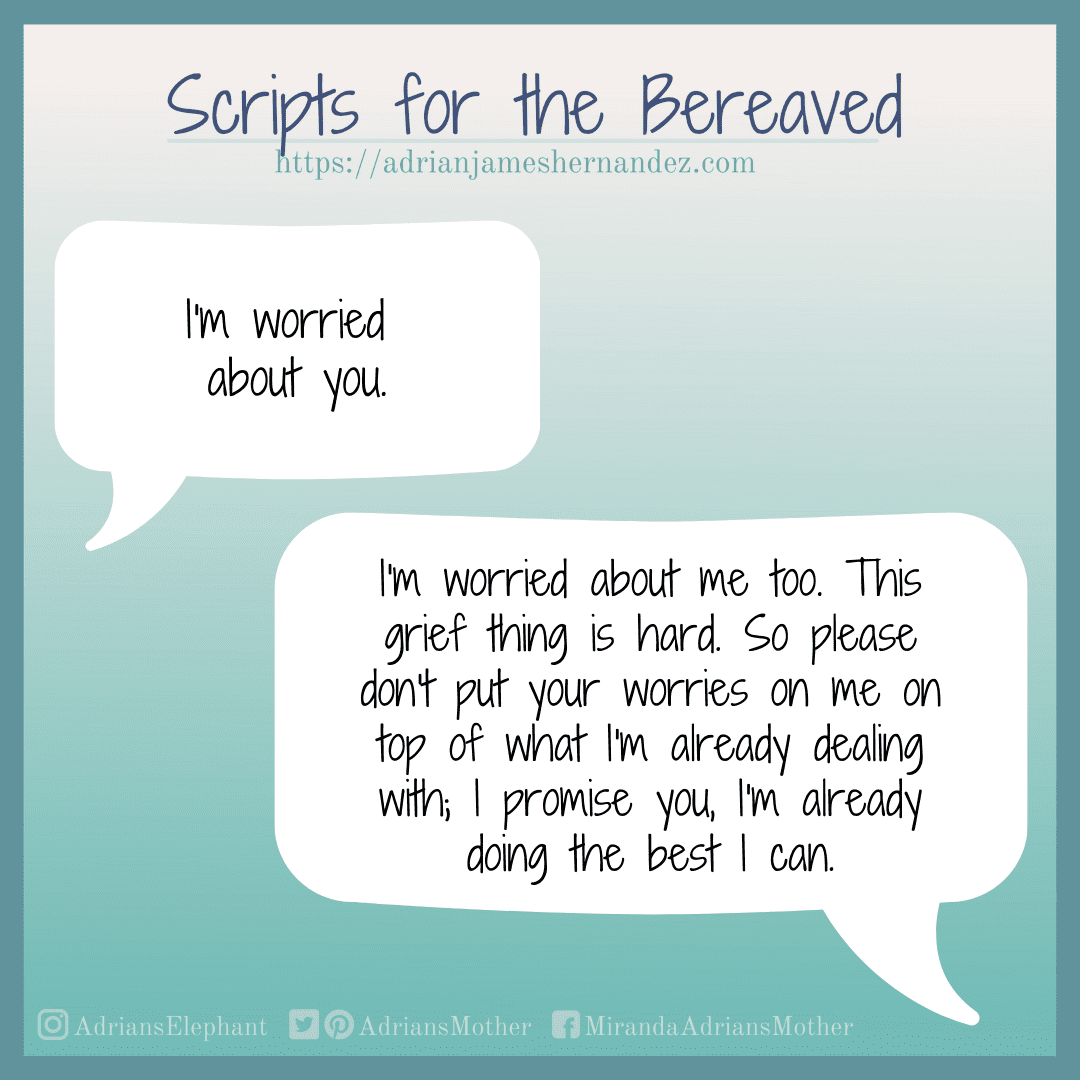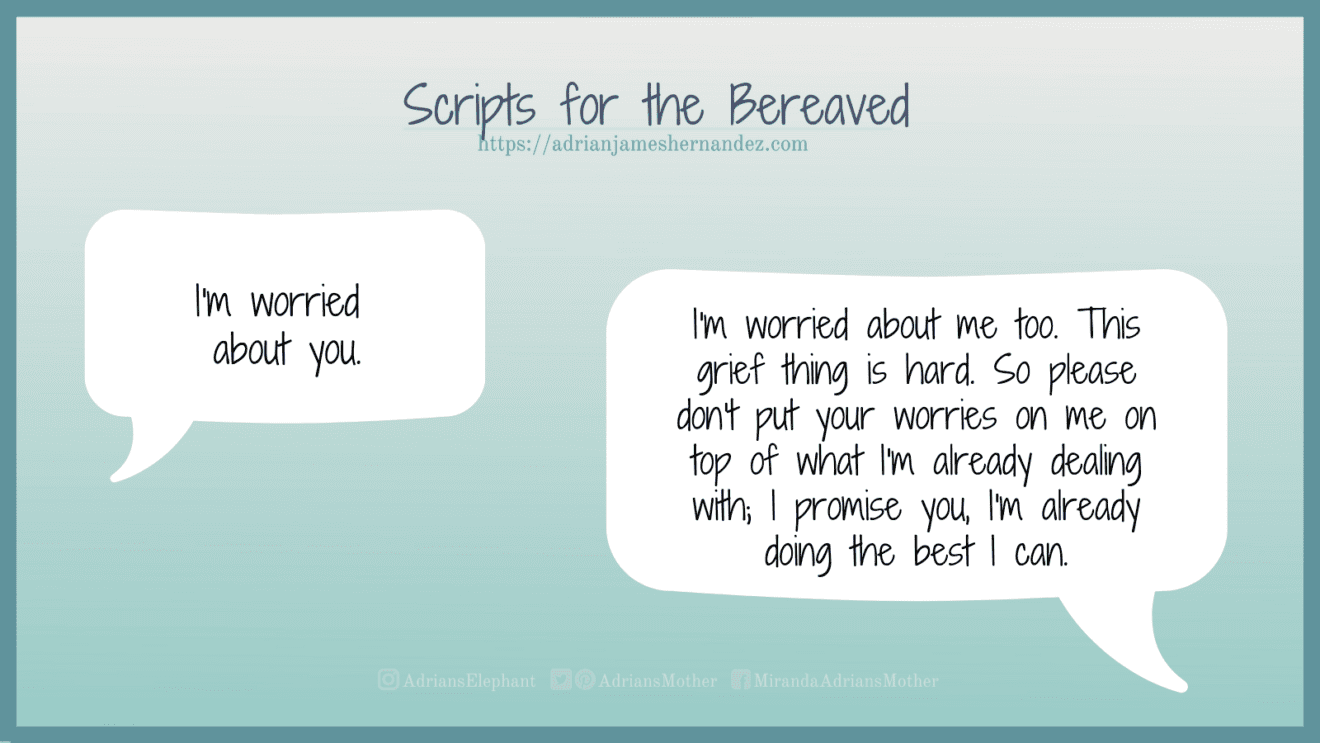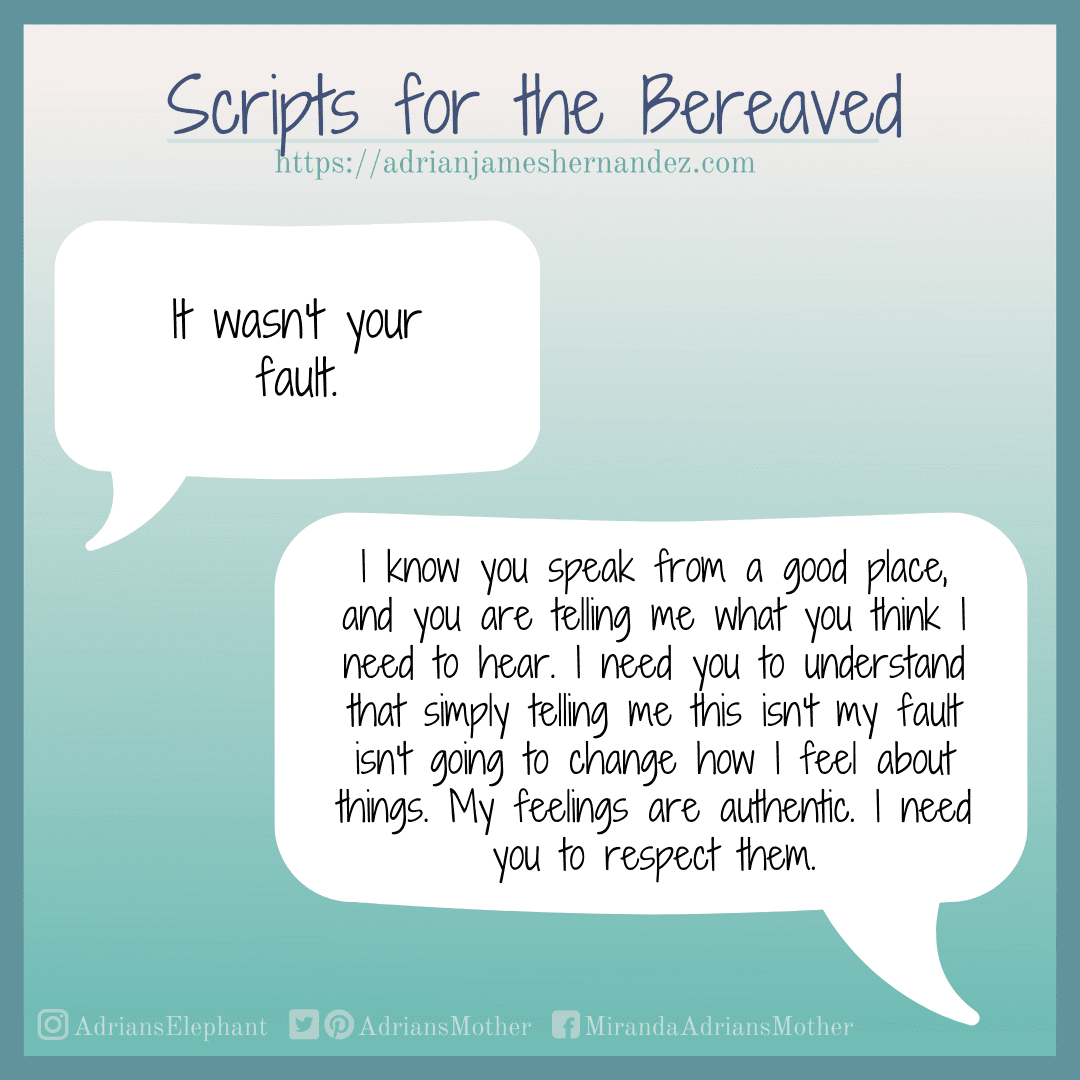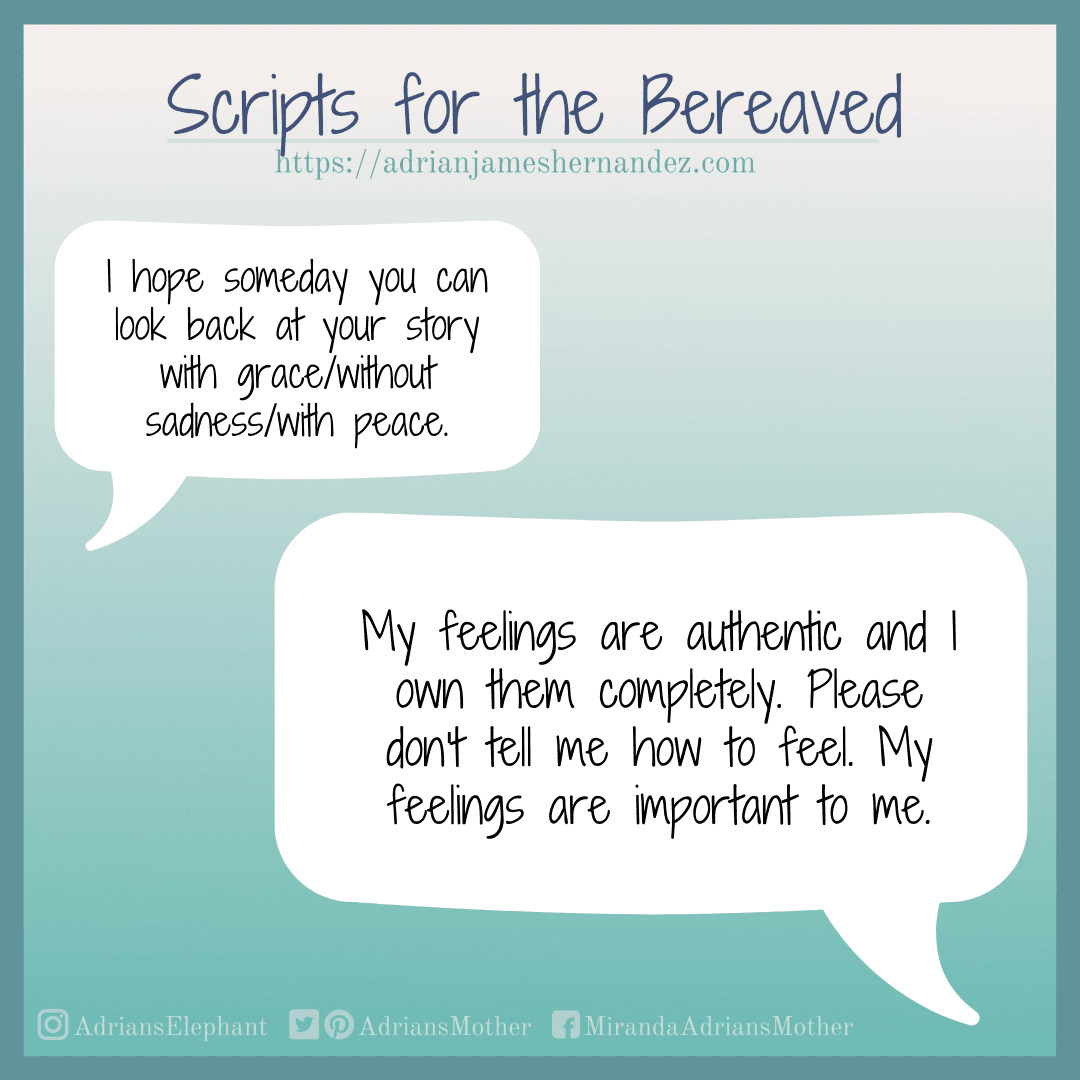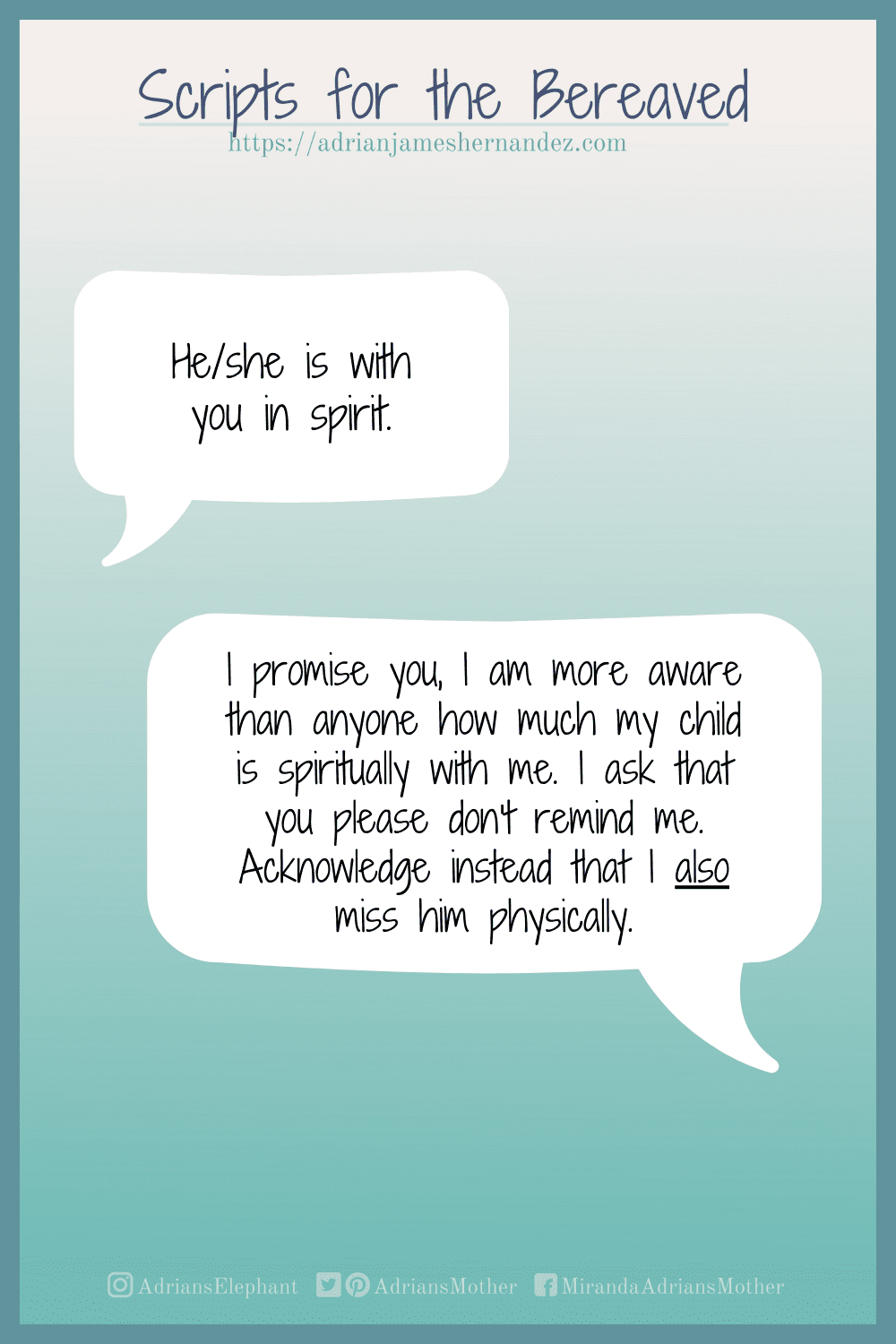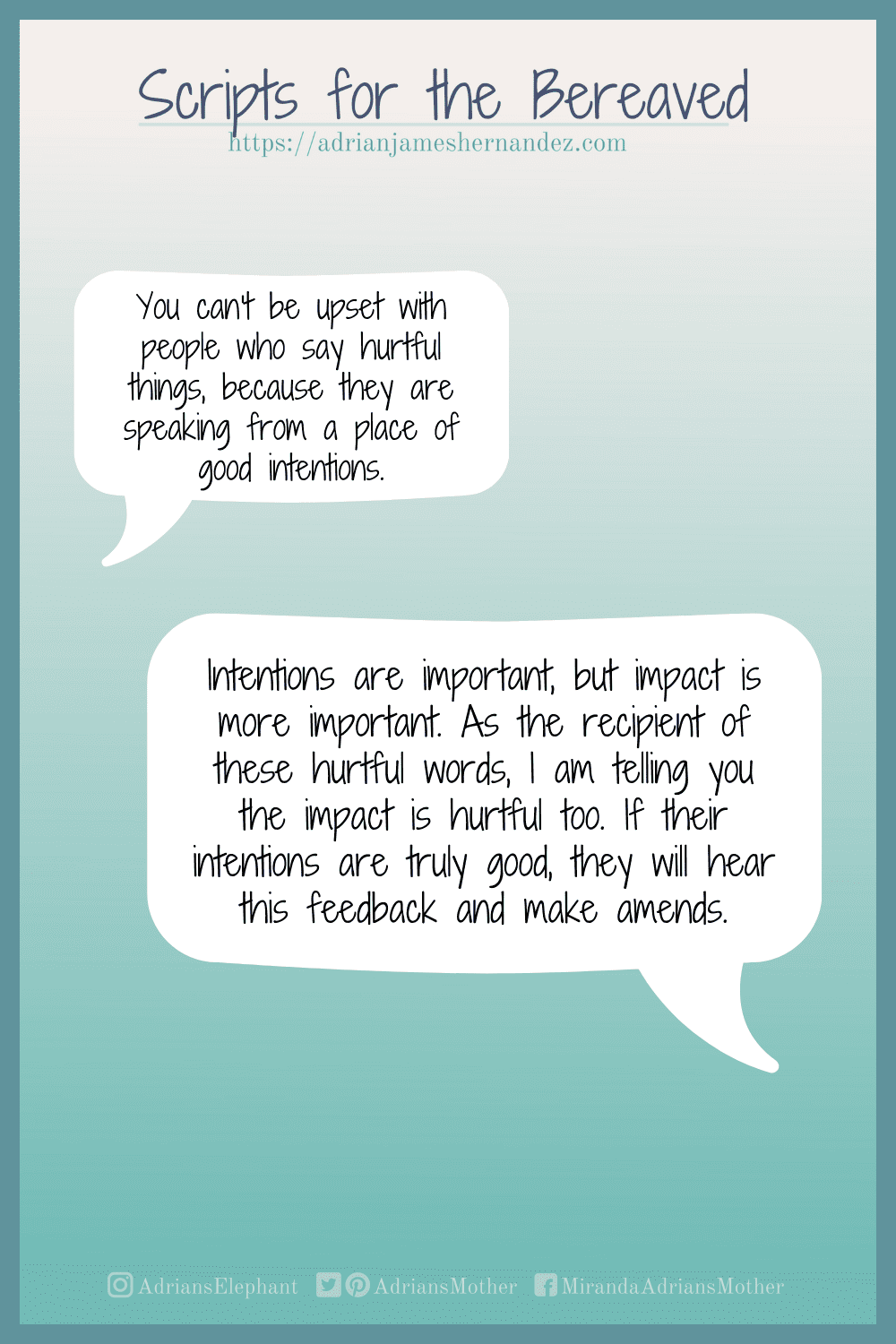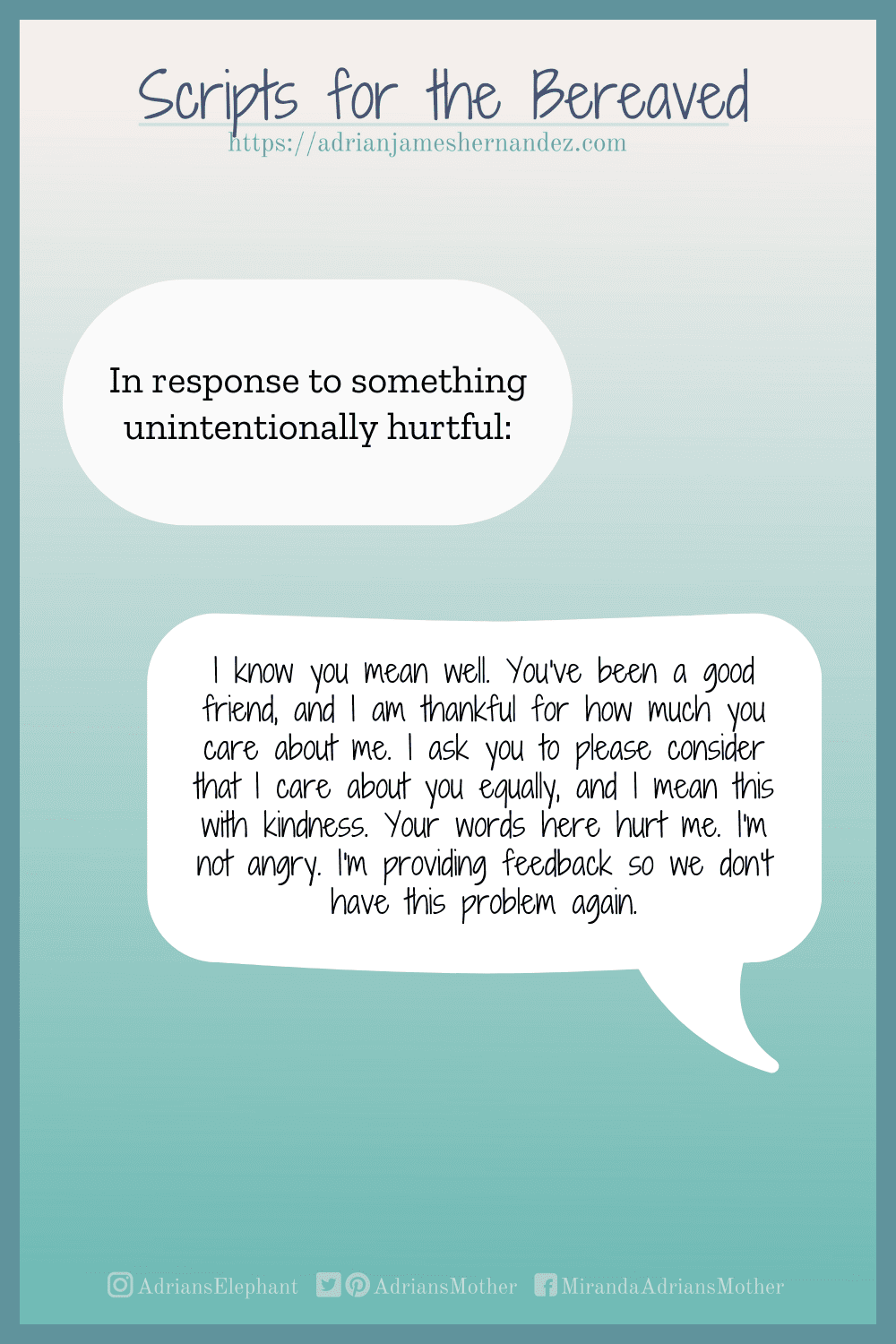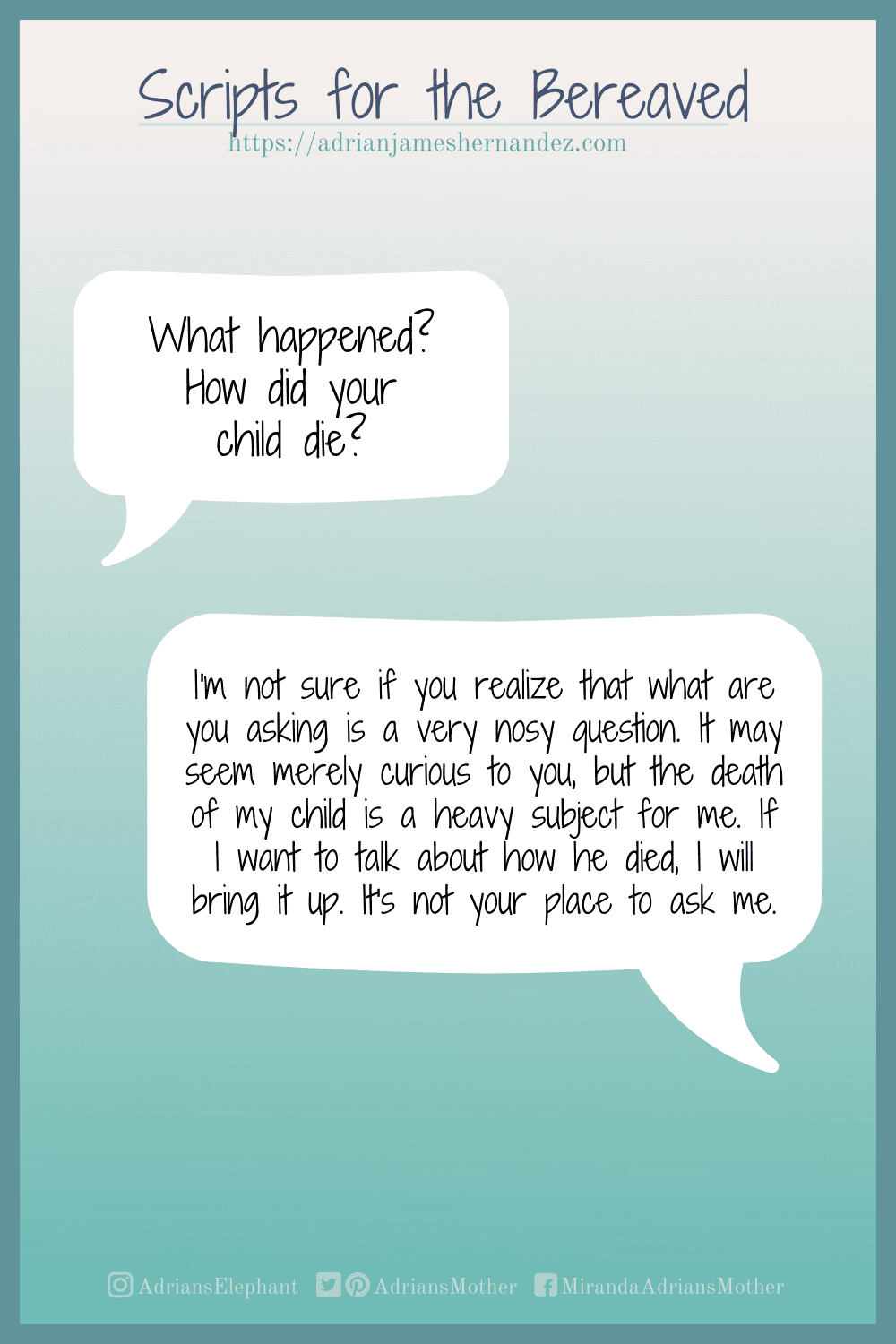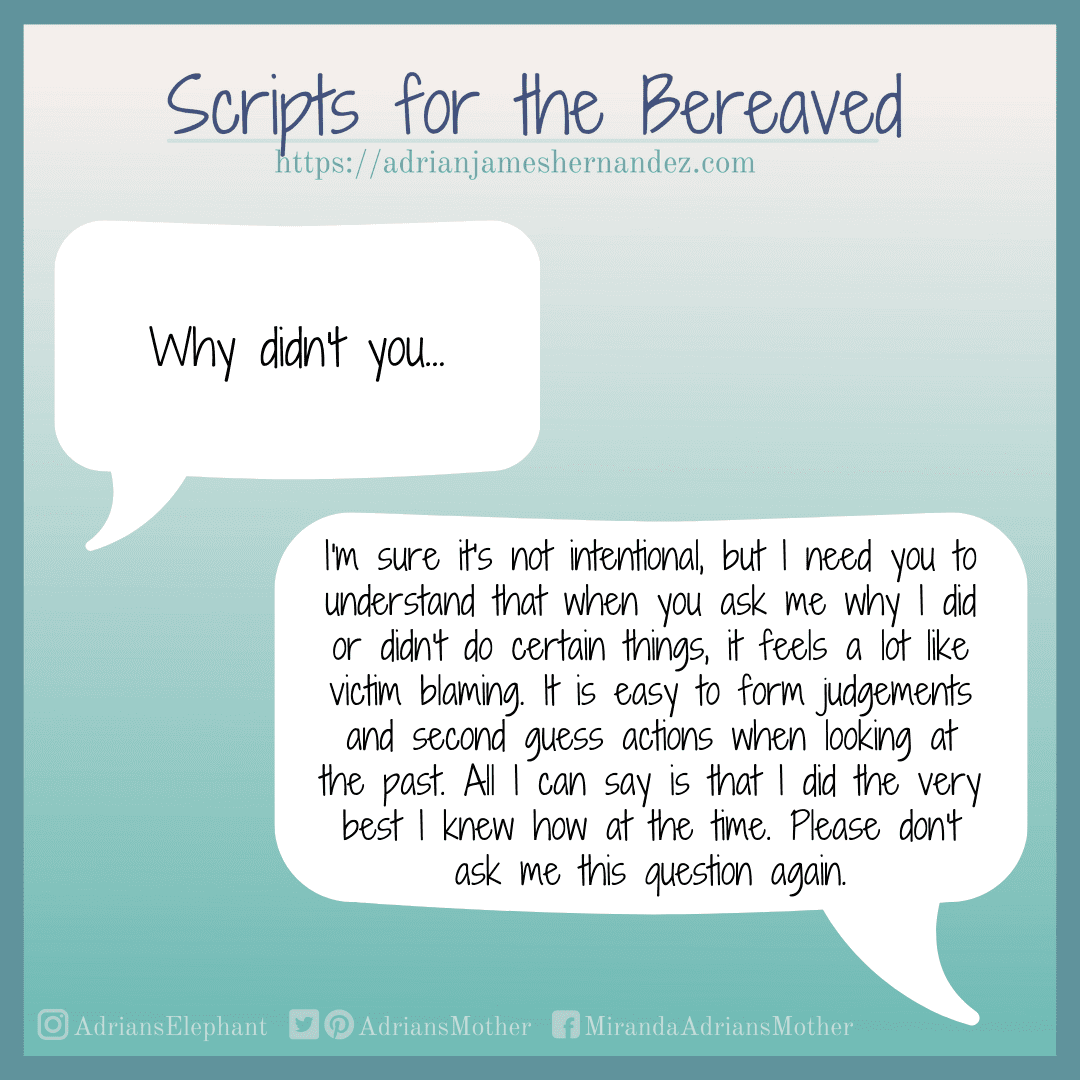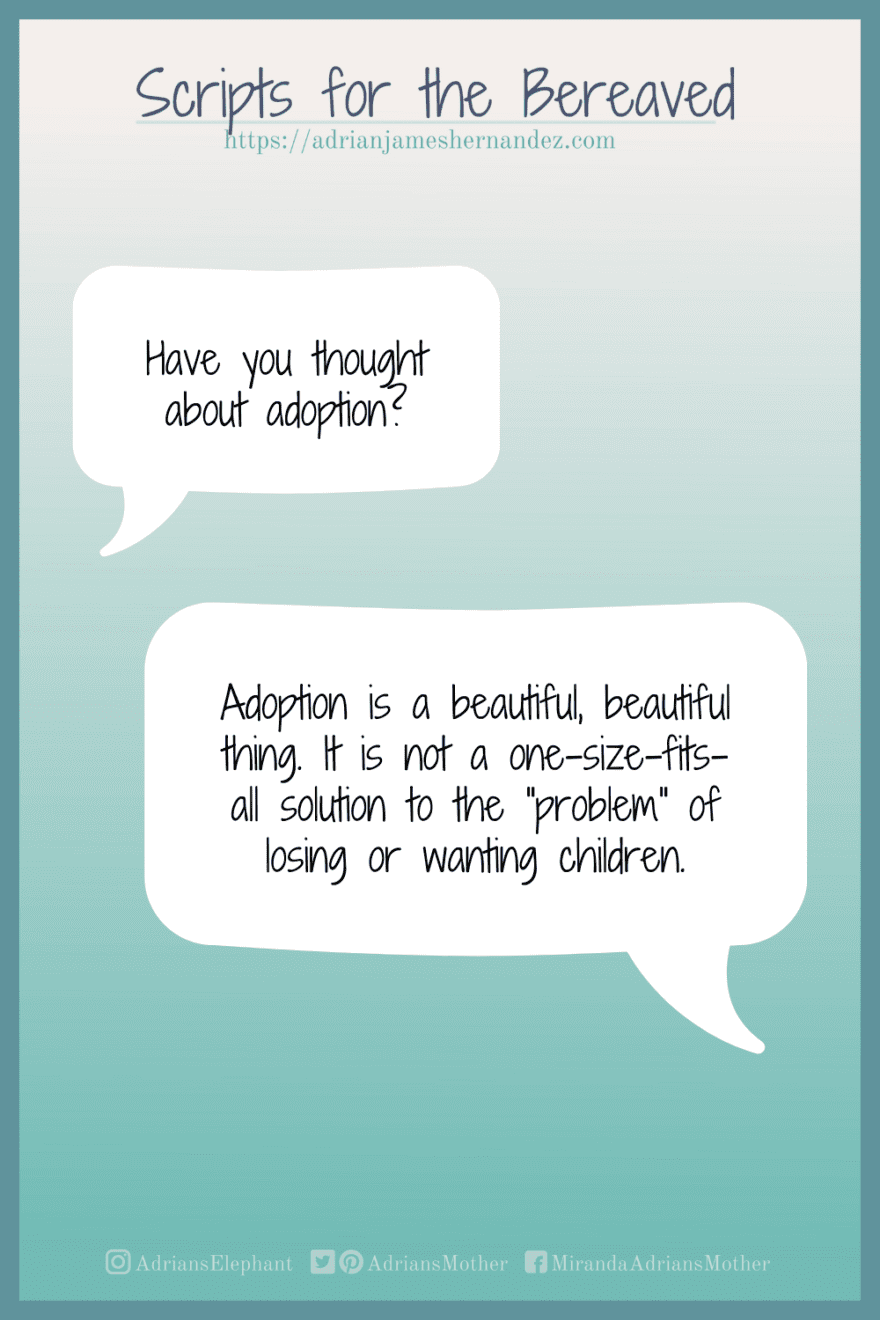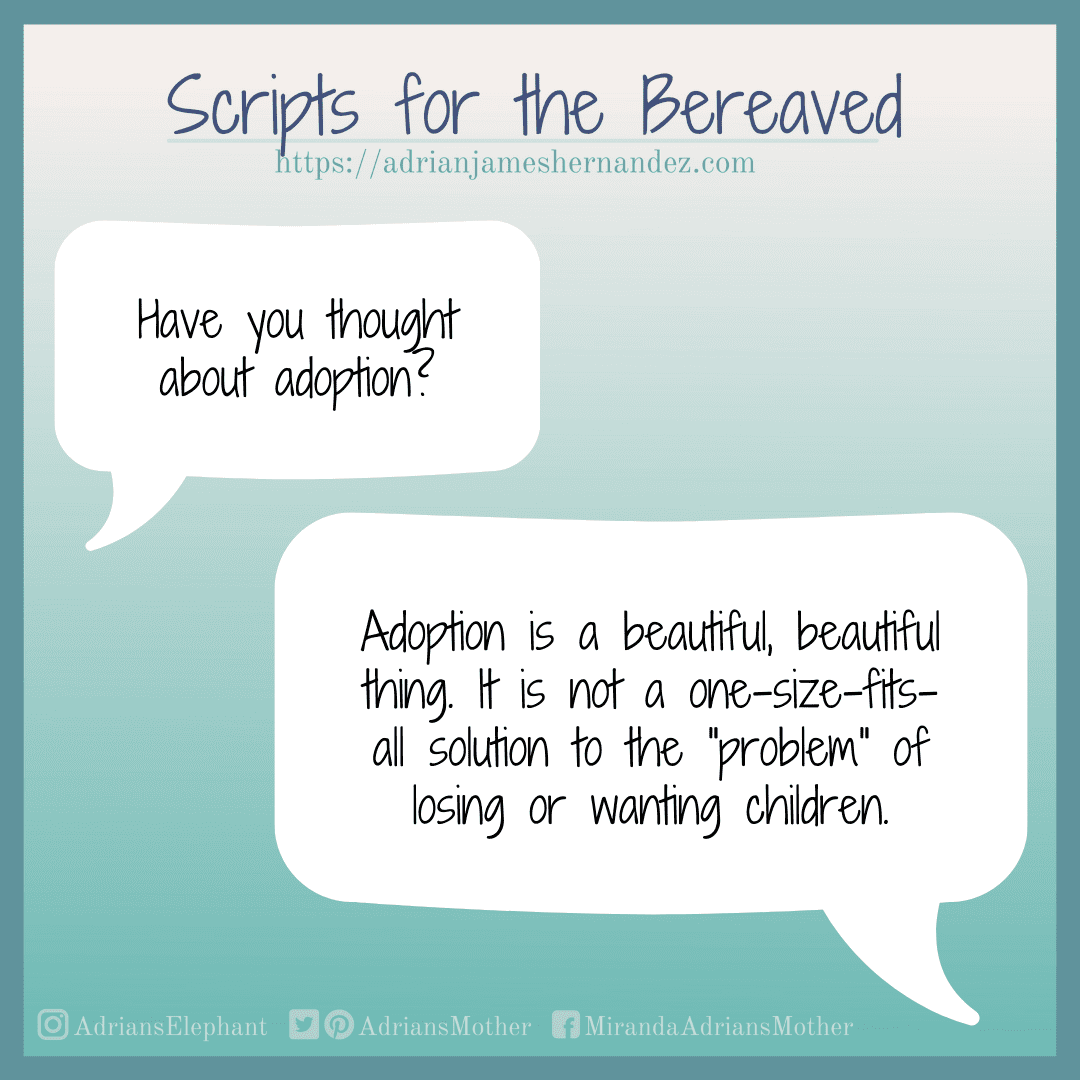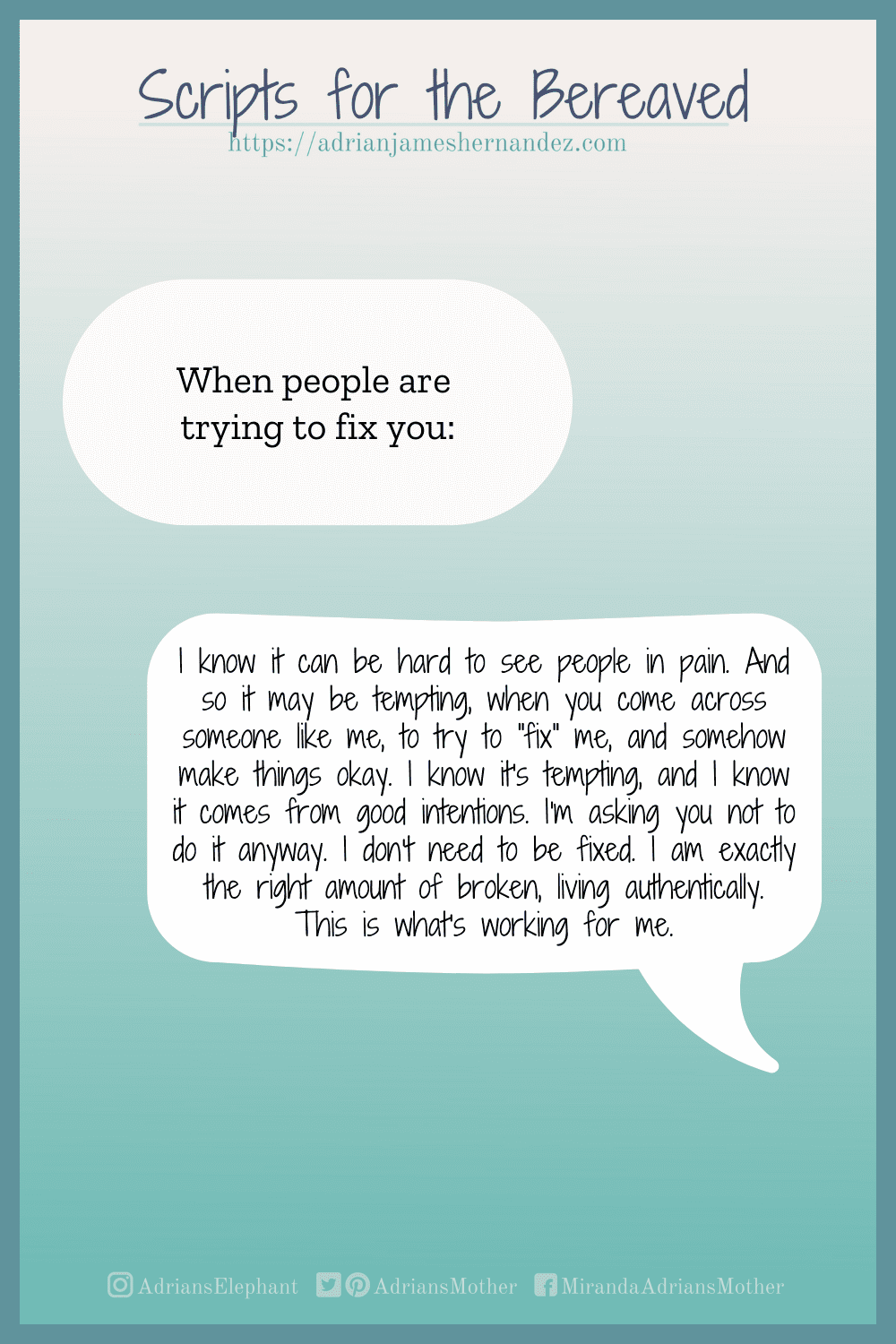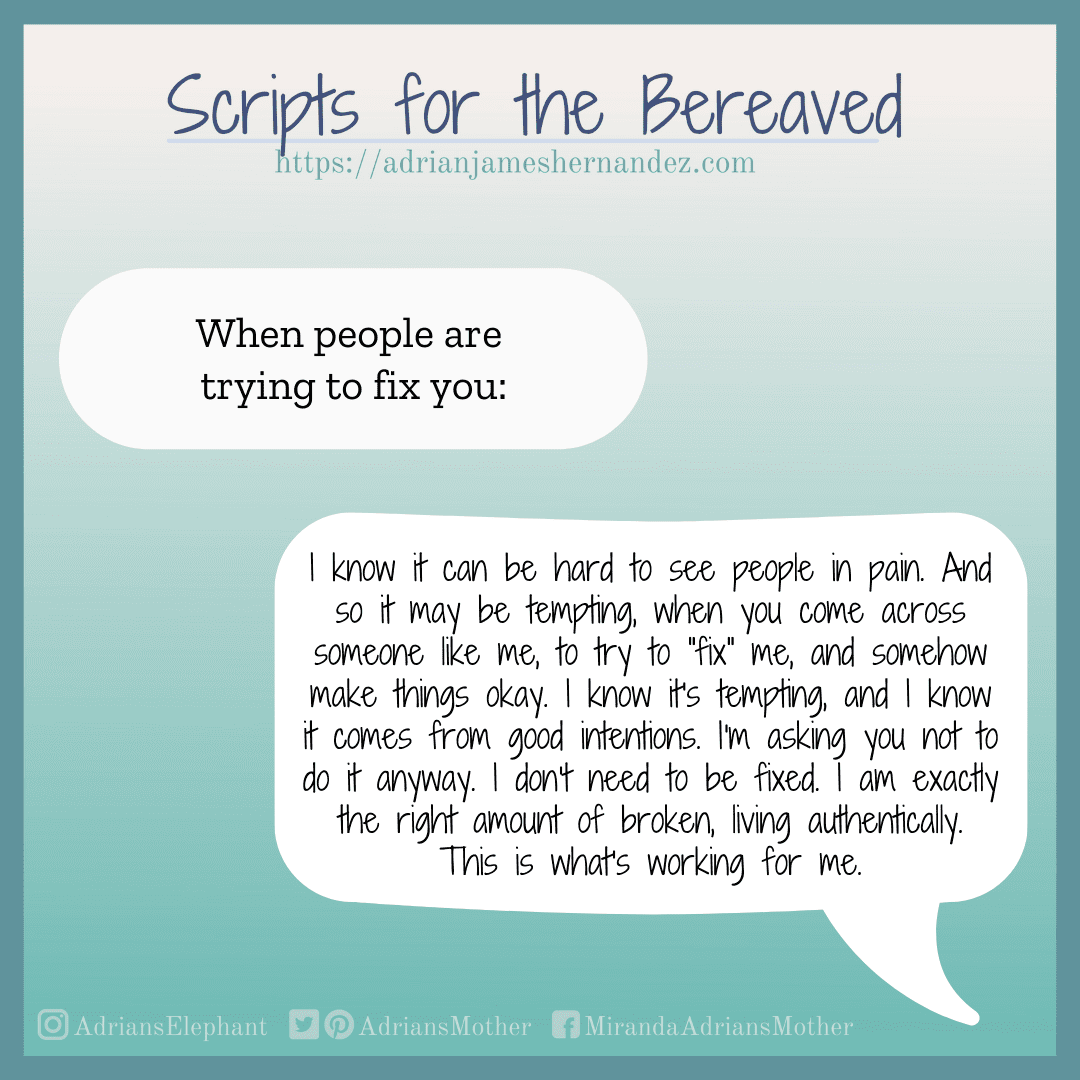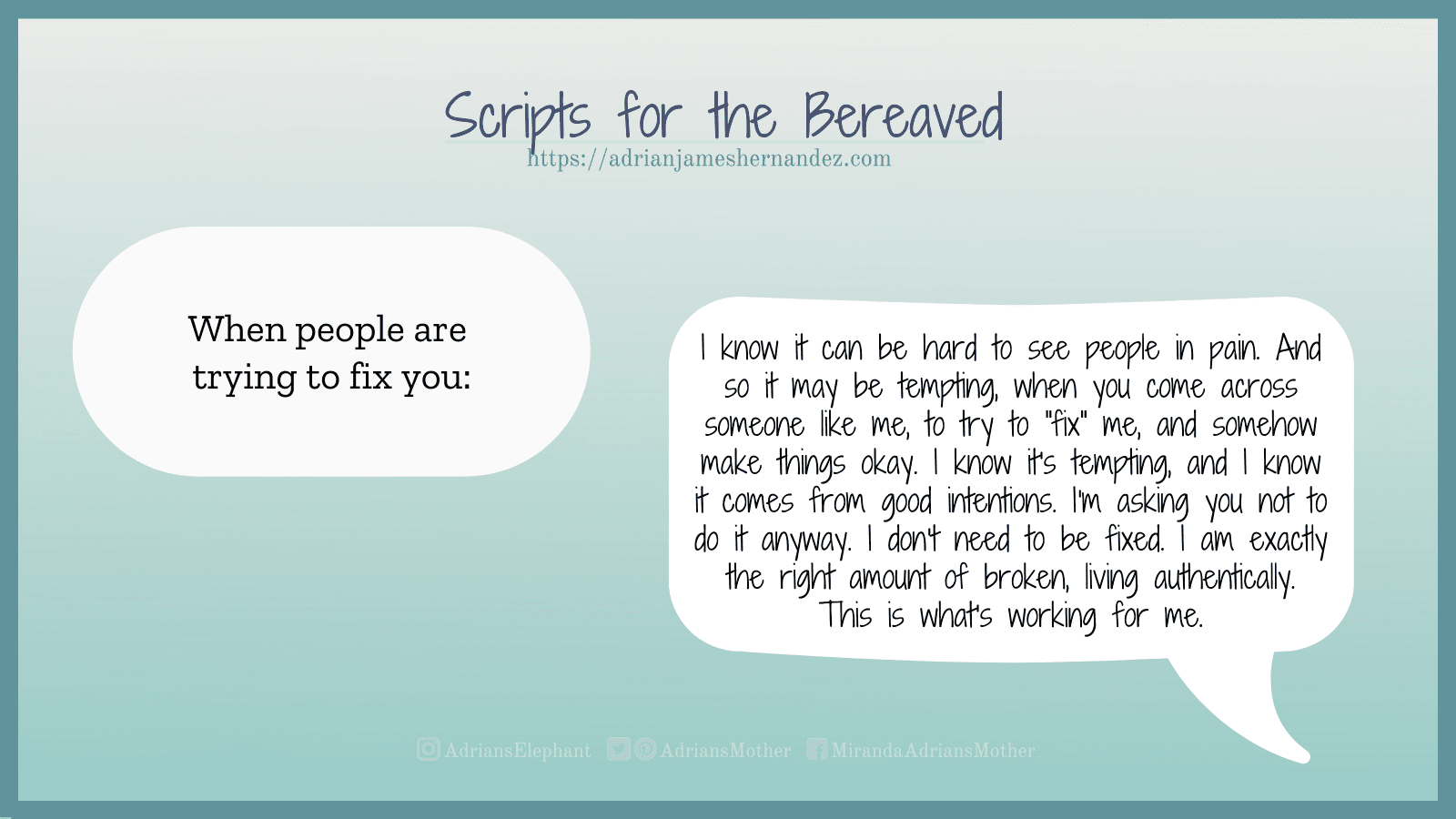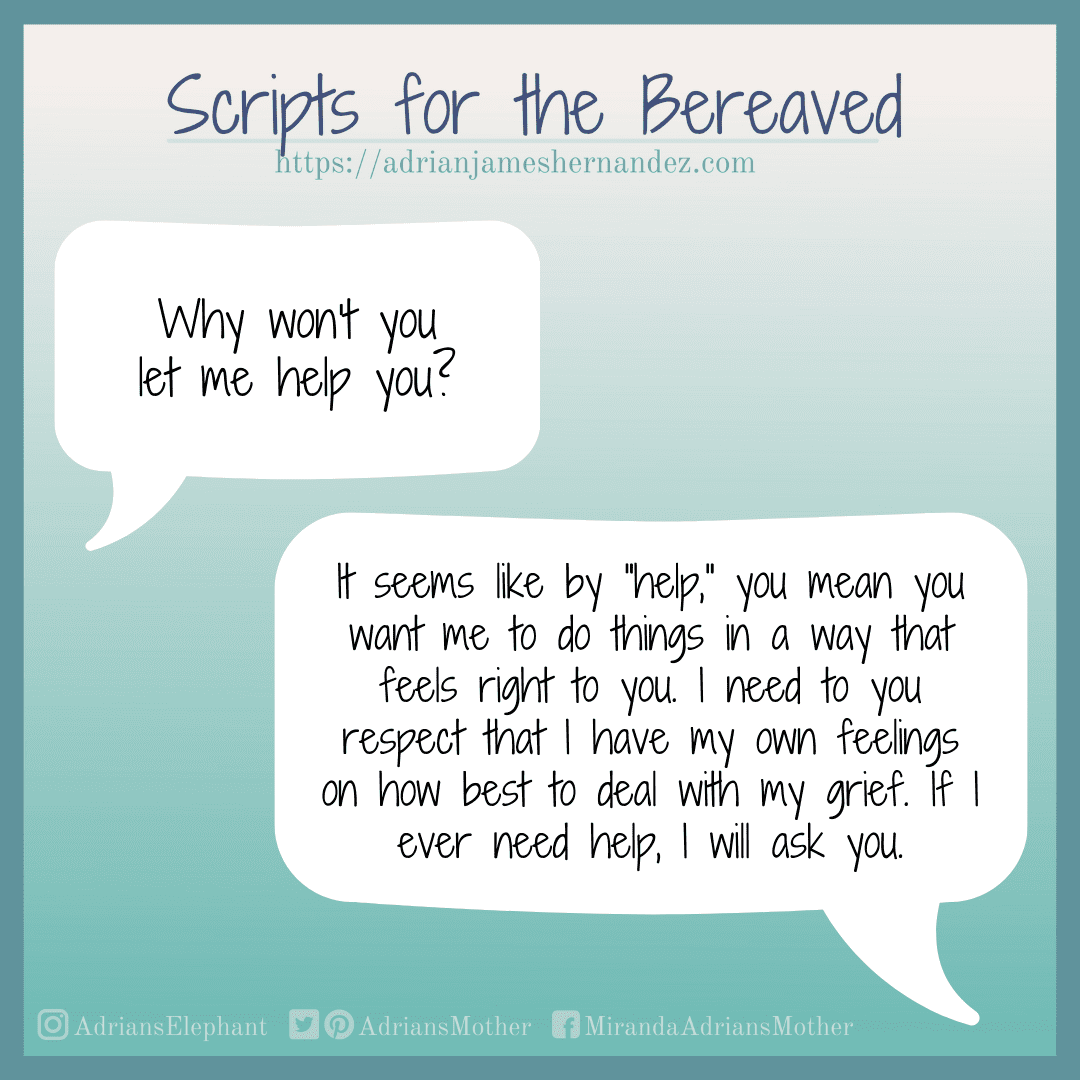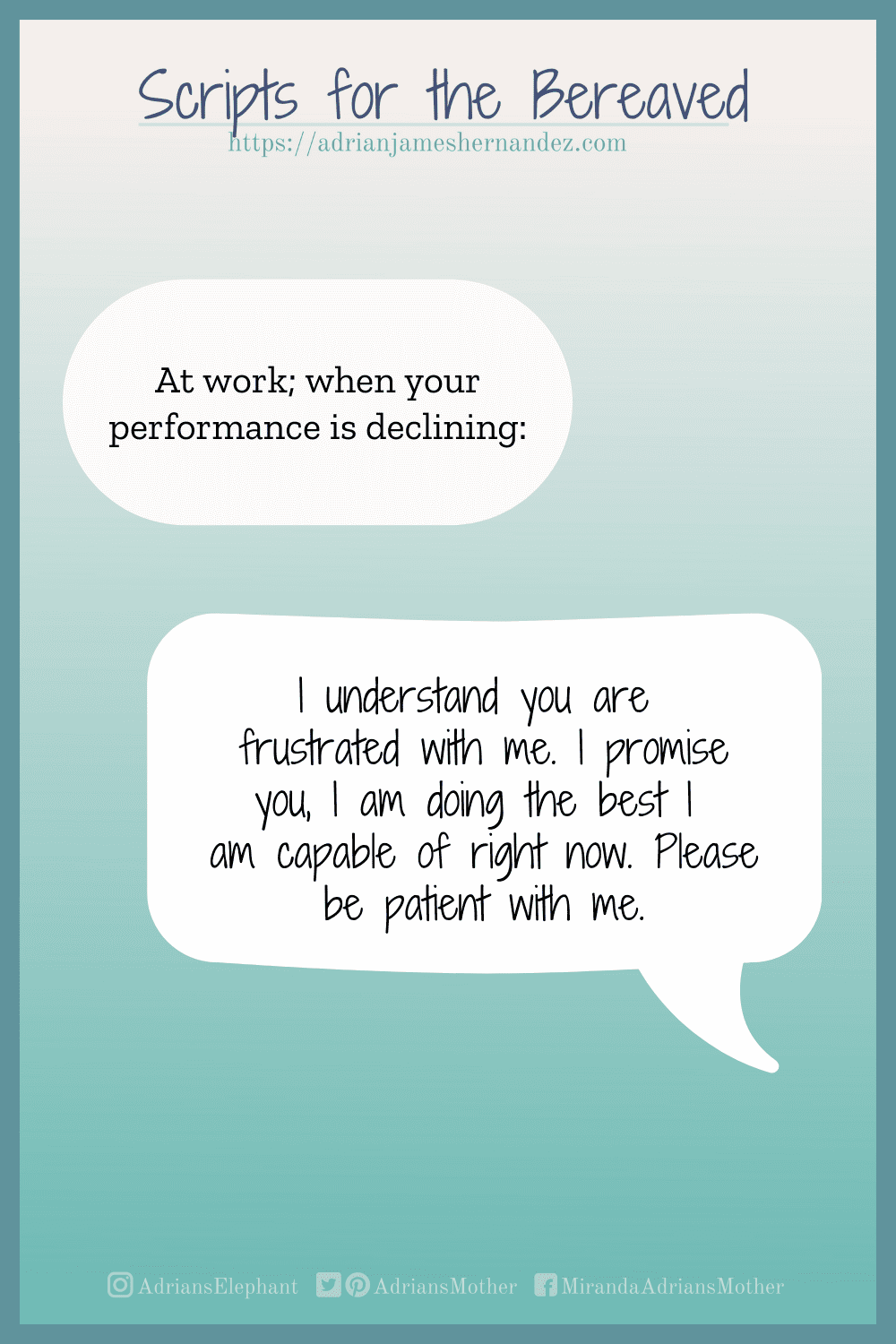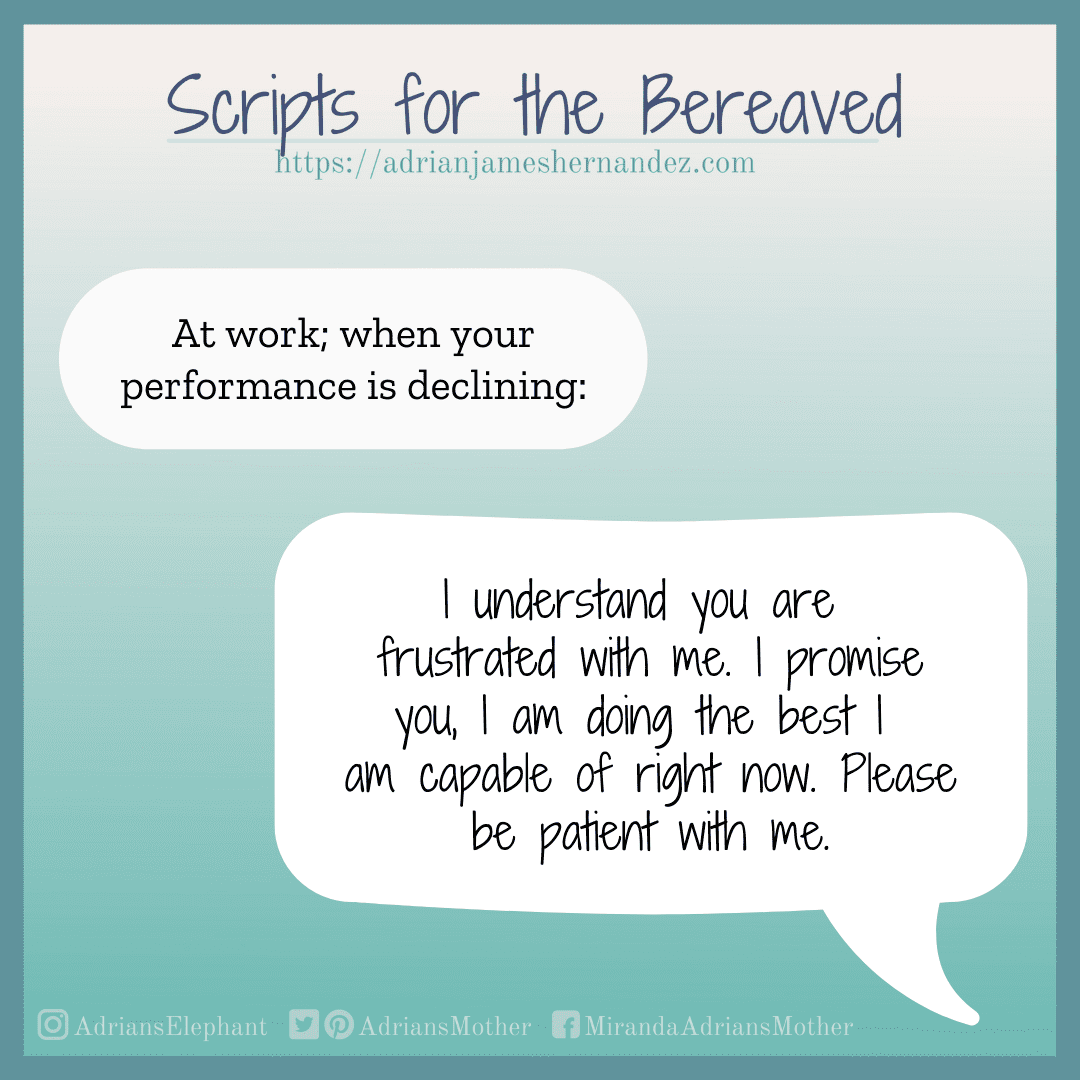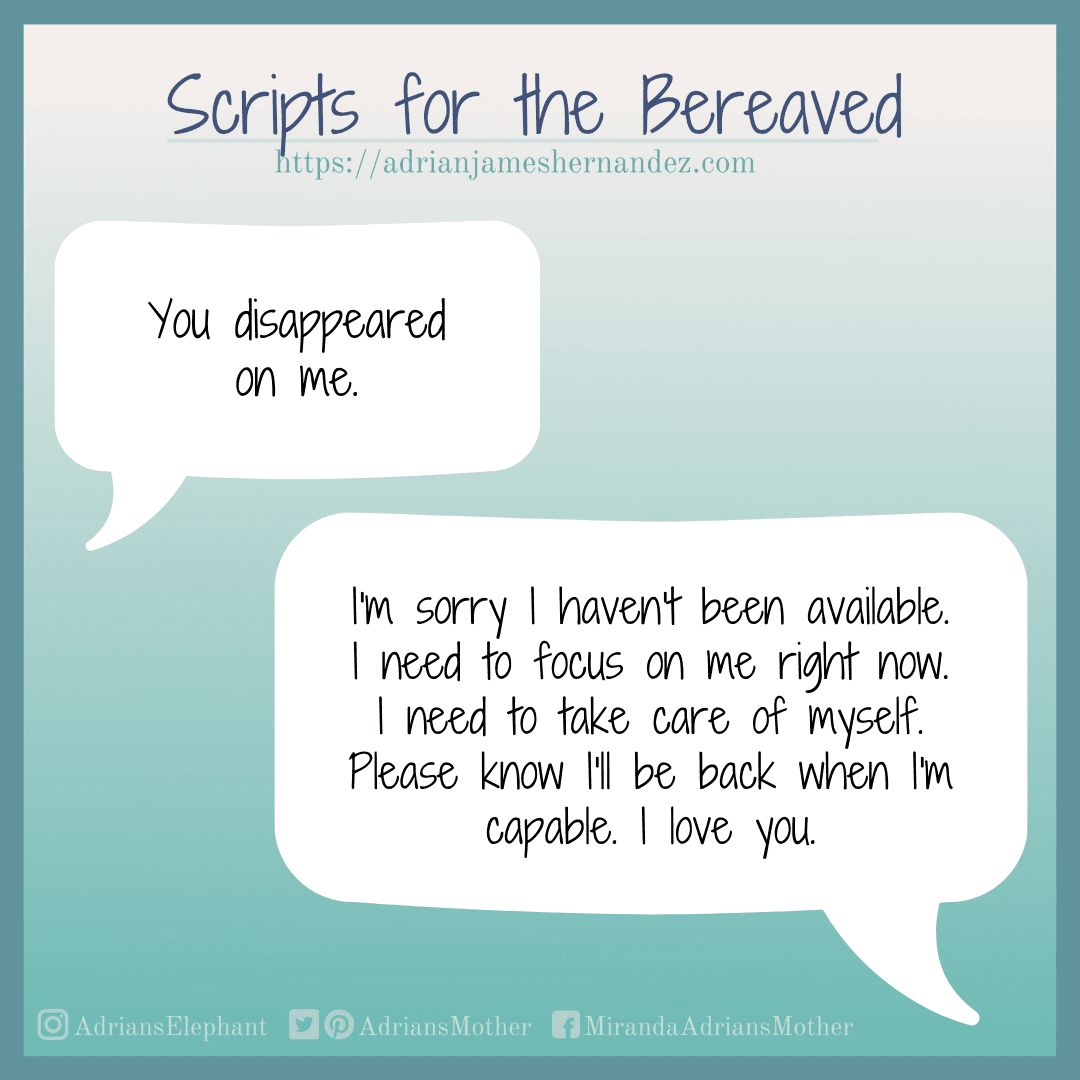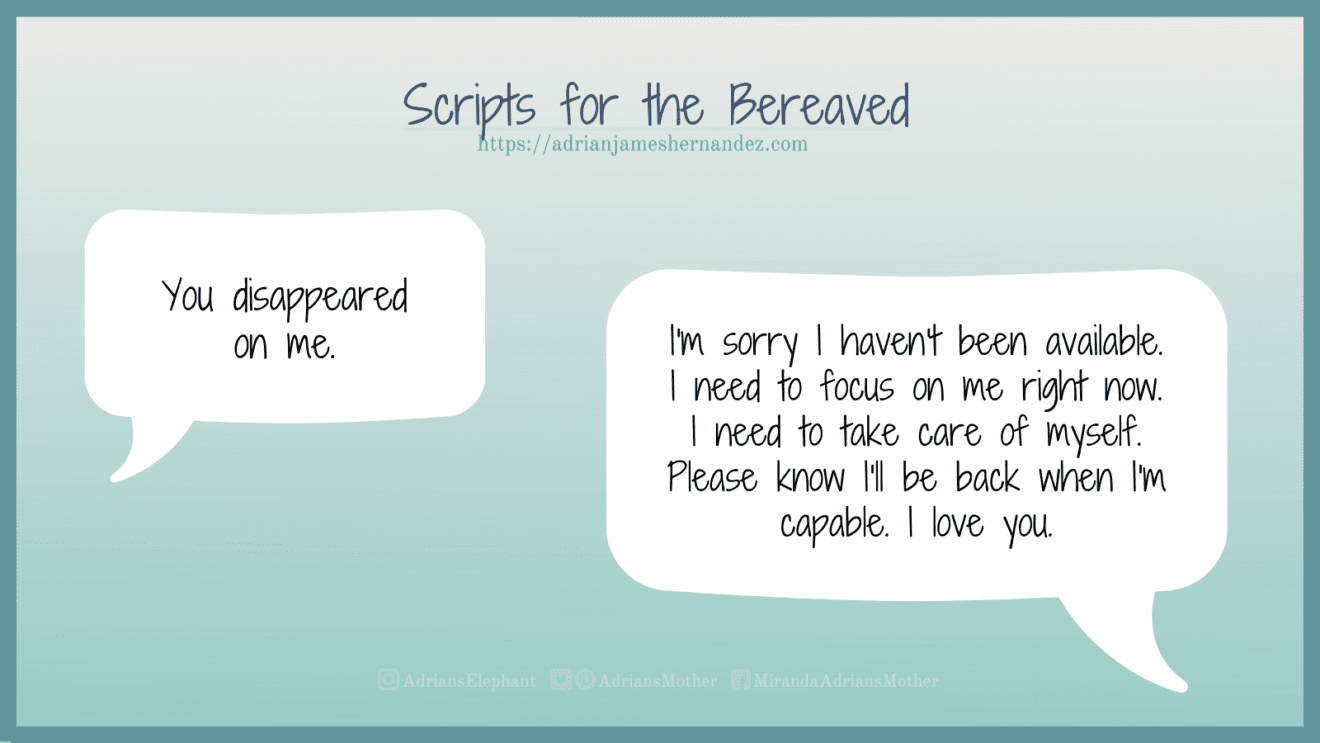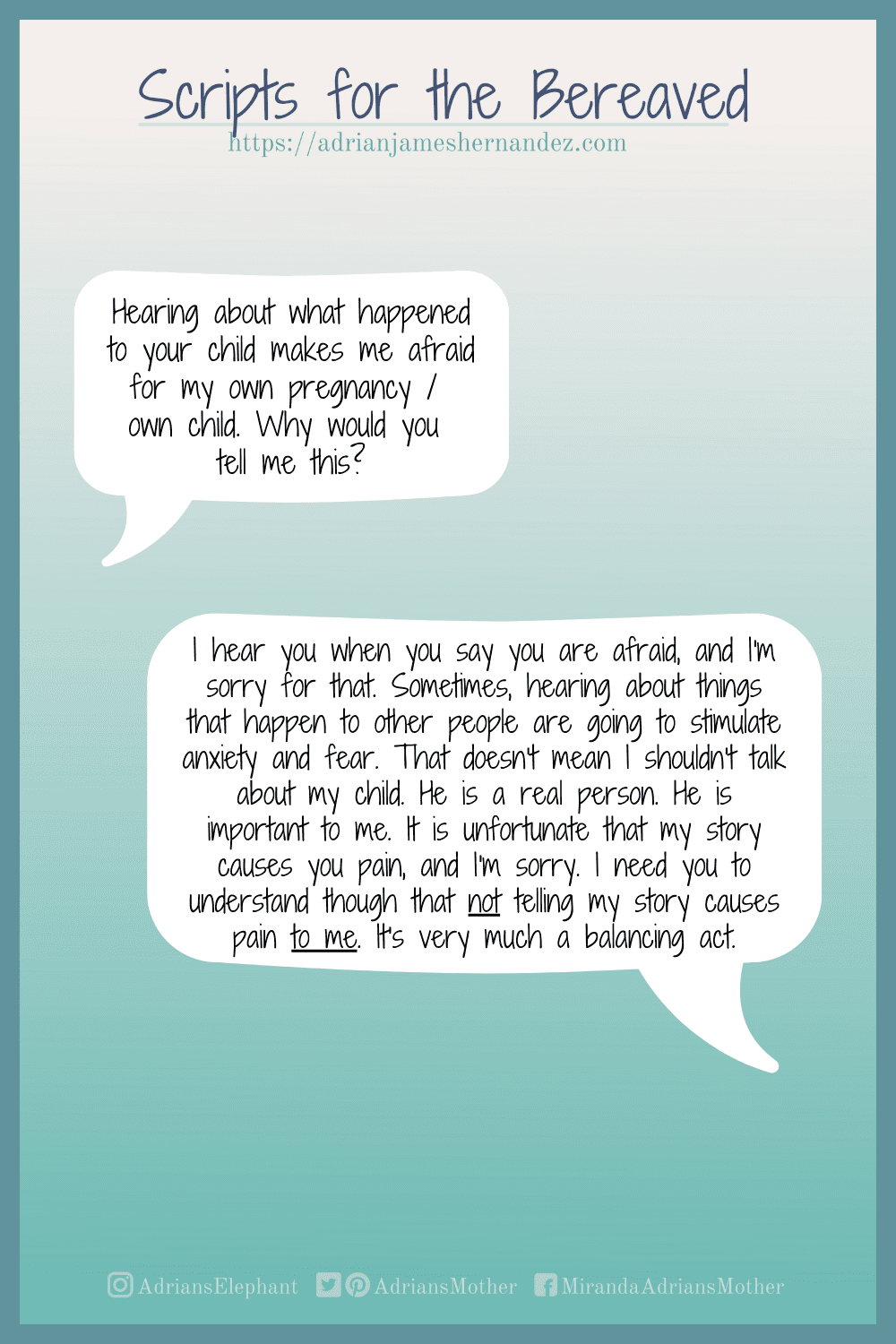When I was new in my grief, there were a number of situations where people said or did something and I wanted to respond, but I just didn’t have the words. Now that I am further out, I have put together a set of potential scripts to use in these situations.
Related: Resources for Bereaved Parents and Families
Related: Resources for Bereavement Coordinators
I would like to keep this as a living document, so if you have any additional suggestions of situations to address, I am always open to new submissions. Please contact me.
“How are you doing?” / “How are you feeling?”
This was an especially complex question for me, and so I have a separate post coming just for this one. But in general, I tried to go for genteel honesty:
- Some days are good, some days are not. I’m sad today. My morning was hard. I woke up and I really missed my son. I saw the children trick-or-treating in my neighborhood, and it made me sad because he should have been there.
“Find the bright side” / “Look on the bright side”
- Sometimes, there is no bright side. Sometimes, things just need to hurt without being ameliorated by a silver lining.
“Have you tried being thankful?” / “It’s so important to be thankful” / “Thankfulness helps” / “Remember the good times”
- I am thankful. I am also sad. It’s important for you to understand that I can feel both of the things, simultaneously.
“Be Positive” / “Think Positive”
- I am positive my child is dead.
When people want you to cheer up / Stop being sad / “Let me cheer you up”
- I know it can be hard to see people in pain. And so it may be tempting, when you see me feeling sad about my son, to try to cheer me out of it. Please don’t. This sadness is necessary.
- I think there is this unfortunate assumption in our world that if someone is sad, then they aren’t also grateful, or they have forgotten the good times. I want to tell you this is untrue; when I am sad about Adrian, it is because of the good times; because he is so loved. When love is not able to meet with the living in this world, it turns into grief. This is normal. This is necessary.
“He/she wouldn’t want you to be sad”
- Of course he would want me to be sad! I certainly want people to be sad when I am gone. Sadness is an authentic and important human emotion.
- You tell me that Adrian wouldn’t want me to be sad, but I know that isn’t true. Because Adrian knows how much I love him, and that my sadness is only one aspect of that love. The way I feel is both important and real, and that’s enough for me to know that it is right.
- It’s difficult to hear you speak about what my son would want, because you can’t possibly know for certain. But I feel confident that if Adrian had any preferences, he would be happy to know I am being authentic.
“Be strong” / “You need to be strong”
- Appearance can be deceiving. Please don’t assume I’m doing okay. Inside I am still dying.
- Sometimes it’s hard to be strong. Sometimes I don’t want to. Please don’t put this burden on me.
“I’m worried about you”
- I’m worried about me too. This grief thing is hard. So please don’t put your worries on me on top of what I’m already dealing with; I promise you, I’m already doing the best I can.
“This was meant to be” / “This happened for a reason” / “Everything happens for a reason”
- I know you mean well, and this is a sentiment that is common in our society. It is unfortunately untrue. Sometimes things happen for no reason at all. There is no reason for the death of my child. It’s okay to acknowledge that some situations just suck.
“It wasn’t your fault”
- I know you speak from a good place, and you are telling me what you think I need to hear. I need you to understand that simply telling me this isn’t my fault isn’t going to change how I feel about things. My feelings are authentic. I need you to respect them.
“If you hadn’t lost your son, your daughter wouldn’t be here”
- I love my daughter with a strength that is unimaginable. I also love and miss and mourn for my son. It is absolutely okay to feel both of these things at the same time.
- It sounds like you are trying to justify the death of my son; implying there is a reason it had to happen. Do understand how hurtful that is? Beautiful things like my daughter can follow tragedy. Those beautiful things will never be justification.
“I hope someday you can look back at your story with grace/without sadness/with peace.”
- I know you mean this with the best of intentions. So please hear my words with those same intentions in return: These words are minimizing. These words imply there is something wrong with speaking about my story. These words imply I have not already found peace by speaking about my story. These words imply I want or need to find peace. Not everybody does. The bereaved will speak about their losses. They do not need your advice; only your ears.
- My feelings are authentic and I own them completely. Please don’t tell me how to feel. My feelings are important to me.
“He/She is with you in spirit”
- I promise you, I am more aware than anyone how much my child is spiritually with me. I ask that you please don’t remind me. Acknowledge instead that I also miss him physically.
- I know, perhaps more than anyone, exactly how much my child is with me in spirit. Please don’t devalue my statement by substituting it with any other. I have a right to miss the physical presence of my child.
- When I tell you that I wish he was here in person, that’s exactly what I mean. I wish he was here, physically with me.
“You can’t be upset with people who say hurtful things, because they are speaking from a place of good intentions.”
- Intentions are important, but impact is more important. As the recipient of these hurtful words, I am telling you the impact is hurtful too. If their intentions are truly good, they will hear this feedback and make amends.
When people say something unintentionally hurtful
- I know you mean well. I need you to understand your words are hurting me. Please stop.
- I know you don’t intend them to be, but your words are hurtful to me. I’m asking you to please stop.
- I know you mean well. You’ve been a good friend, and I am thankful for how much you care about me. I ask you to please consider that I care about you equally, and I mean this with kindness. Your words here hurt me. I’m not angry. I’m providing feedback so we don’t have this problem again. Because I do love you, and I am so thankful to have you in my life, and it’s easiest to be thankful when we’re on the same page.
When it seems as if someone is projecting their own situation on you
- It sounds like you are coming from a place of experience. I can appreciate that. I need you to understand my experience is different. Please don’t assume things are going the same way for me.
- I’m sorry; I just don’t have your strength. This is what works for me.
“What happened?” / “How did your child die?”
- I’m not sure if you realize that what are you asking is a very nosy question. It may seem merely curious to you, but the death of my child is a heavy subject for me. If I want to talk about how he died, I will bring it up. It’s not your place to ask me.
“Why didn’t you…”
- I’m sure it’s not intentional, but I need you to understand that when you ask me why I did or didn’t do certain things, it feels a lot like victim blaming. It is easy to form judgements and second guess actions when looking at the past. All I can say is that I did the very best I knew how at the time. Please don’t ask me this question again.
“One day you’ll get your baby”
- I already have my baby. His death does not negate his existence.
- My child’s death does not negate his existence. Please do not minimize his humanity by telling me to have another child.
- I already have my baby. He is a real person. He was born. Please don’t dismiss his existence by jumping to talk about future children. He deserves acknowledgment too.
“Have you thought about adoption?”
- Adoption is a beautiful, beautiful thing. It is not a one-size-fits-all solution to the “problem” of losing or wanting children.
- Adoption is a beautiful thing. It is also not for everyone. It comes with its own inherent risks, pitfalls, and trauma, and not every person is equipped to deal with that.
When people are trying to fix you
- I know it can be hard to see people in pain. And so it may be tempting, when you come across someone like me, to try to “fix” me, and somehow make things okay. I know it’s tempting, and I know it comes from good intentions. I’m asking you not to do it anyway. I don’t need to be fixed. I am exactly the right amount of broken, living authentically. This is what’s working for me.
“Why won’t you let me help you?”
- Why is your need to help me in ways I haven’t asked for more important than my need to decide and do things for myself?
- It seems like by “help,” you mean you want me to do things in a way that feels right to you. I need to you respect that I have my own feelings on how best to deal with my grief. If I ever need help, I will ask you.
In the face of (persistent) unsolicited advice
- I know your heart is in the right place. So please hear me and know my heart is in an equally good place when I say this: your words are not helpful. Please stop.
- I am doing what is best for me. I need you to respect that.
- I am handling things in a manner that is authentic and important to me. Please respect that.
- I have told you I am doing what works for me. I need you to respect that.
Repeat, repeat, repeat…
At work; when your performance is declining
- I understand you are frustrated with me. I promise you, I am doing the best I am capable of right now. Please be patient with me.
With friends; in response to complaints: “You disappeared on me”
- I’m sorry I haven’t been available. I need to focus on me right now. I need to take care of myself. Please know I’ll be back when I’m capable. I love you.
- It’s been awhile since we’ve really talked, and I know I don’t have a good feel for what’s going on in your life. I do know how quickly things can change, and if I’ve missed something important, I’m sorry. Our friendship is important to me, and I want to be there for you when you need it. If you are available, I would love to catch up. We can chat, or even run errands together. It would be great to see you.
“Hearing about what happened to your child makes me afraid for my own pregnancy / own child. Why would you tell me this?”
- I hear you when you say you are afraid, and I’m sorry for that. Sometimes, hearing about things that happen to other people are going to stimulate anxiety and fear. That doesn’t mean I shouldn’t talk about my child. He is a real person. He is important to me. It is unfortunate that my story causes you pain, and I’m sorry. I need you to understand though that not telling my story causes pain to me. It’s very much a balancing act.
In response to requests for a trigger warning
- I hear you when you say this information is triggering. Unfortunately this is my daily reality. This place exists as a document of my love for my child. It’s one of the few places in my life where I have that. I choose not to include trigger warnings here.
- I hear you when you say this information is triggering. I’m sorry for the pain you feel. That is not my intention. Please understand being asked to include a trigger warning on my lived experience is triggering to me. I choose not to do this.
Related Posts:
Miranda’s Blog: Things I Didn’t Get to Say
Miranda’s Blog: Understanding






